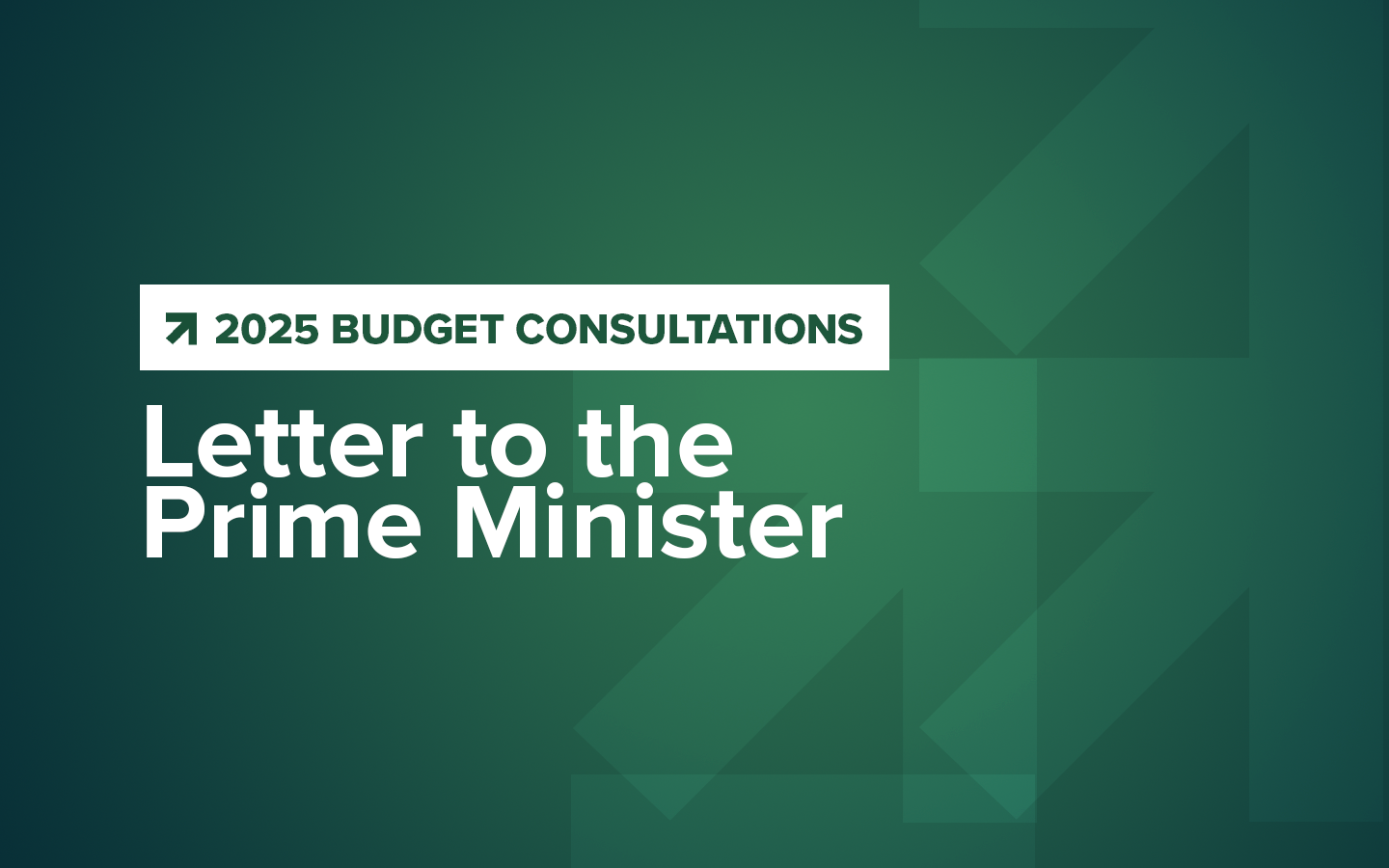Letter to the Prime Minister about the 2025 budget
Letter to The Right Honourable Mark Carney, P.C., M.P., Prime Minister of Canada, regarding the 2025 budget consultations.
Dear Prime Minister,
On behalf of the Business Council of Canada (BCC), thank you for the opportunity to contribute to the federal government’s fiscal deliberations. We have just completed consultations with leading Canadian economists and policy experts, alongside a survey of our members. The message we received is straightforward:
- Canada is in the midst of an investment crisis. Our country needs more investment—public and private—to raise productivity and growth, and confront both new and ongoing challenges we face as a nation.
- Any investment push must sit inside a credible fiscal plan that prevents further deterioration of Canada’s balance sheet.
Even before the sequence of global shocks over the past half decade, business investment in Canada had been weakening and this has shown up in low productivity and stagnant incomes for the nation’s households and workers. The disruption to the global trading order, accelerated this year by U.S. policy shifts under President Donald Trump, has only deepened the crisis.
Let’s be clear: the Trump Administration’s America First trade policy has exposed, in stark ways, longstanding weaknesses and vulnerabilities in the Canadian economy. U.S. policies did not cause these vulnerabilities. They are the result of policy actions – or inaction – here in Canada.
In that light, Canada’s business community is encouraged that you have framed your economic agenda around the need to drive more investment into our economy.
You have a mandate to construct a pro-growth budget at a difficult time for the nation, rife with global economic and political uncertainty. We support investments that diversify our markets, make us more resilient, improve our competitiveness, crowd in private capital, and lift the economy’s growth potential. Lower taxes on business investment and capital will be critical in this effort.
But any fiscal latitude in the short term must come with some very important conditions.
One, the budget should be part of a broader growth strategy. Canada’s investment problems won’t be solved by government spending. A lot can be done, with a stroke of a pen today, to unleash private enterprise and capital that doesn’t cost the government a penny. All that one needs is political courage.
Two, the budget needs to be laser focused on investment. We have no time or fiscal capacity for political games or gimmicks.
Three, the fiscal plan needs to come with a serious deficit reduction plan in the medium term.
We cannot borrow our way to prosperity. If your government decides that deficit-financed investment does need to take place, it must be done responsibly. Any deterioration in the fiscal picture, even for investment purposes, must be paired with a believable plan that reduces the deficit year after year.
To make this concrete, we recommend five simple commitments:
- Set a credible path for deficit reduction. We recognize the difficult starting point and the need for upfront investments, but that should be underwritten by meaningful year-over-year reductions in the absolute deficit. At a minimum, we would expect the government to halve this year’s elevated deficit within three years.
- Keep spending in check. Hold total spending growth below nominal GDP growth over a medium-term time horizon and run a comprehensive, first-principles program review. Spending control also means no new unfunded permanent programs; any ongoing spending increase should be matched by permanent savings or an identified revenue source. Priorities need to be traded off, not layered on top of each other.
- Borrow only for productive investment, with no gimmicks. The BCC supports responsible borrowing for projects and initiatives that demonstrably raise our economic capacity, such as trade-enabling infrastructure and strategic defence assets. However, we have significant reservations about the proposal to split the operating and capital budgets, as experts caution it is unnecessary and risks being used to relabel current spending as “investment.” If the government proceeds, it must be governed by clear, public definitions and an independent oversight mechanism to maintain credibility.
- Adopt two clear fiscal anchors. On top of a deficit reduction plan, we recommend the adoption of additional fiscal guardrails to guide policy over the medium term. We propose at least two: a declining debt-to-GDP ratio and stable or falling interest-to-revenue burden. The government should adopt a “contain and reduce” principle with respect to fiscal sustainability metrics.
- Commit to a pro-growth structural reform agenda. A credible fiscal plan cannot succeed without a growing economy. Without growth, in other words, there is no path to fiscal sustainability. We urge the government to commit to critical and overdue reforms: a comprehensive tax reform to simplify the system and encourage capital formation, remove barriers to capital in key sectors like oil and gas, and undertake a deep review of Canada’s regulatory process to unlock private sector investment. When investors can price time and risk, more projects will get over the finish line. Equally important is the successful review and renewal of the United States-Mexico-Canada Agreement (USMCA). Canada will not attract the business investment, either foreign or domestic, needed to grow our economy if we do not retain preferential access to our largest and most important trading partner. Our economic growth strategy must maintain high levels of trade and investment with the United States even as we increase trade and investment with other key markets.
These steps are pragmatic, non-ideological, and fully compatible with the objective that I believe we both share to create greater prosperity for all Canadians.
We would welcome the chance to discuss these recommendations further and to share the detailed findings of our consultations at your convenience.
Thank you for your consideration, and for your service to Canadians.
Respectfully,

Goldy Hyder
Cc:
François-Philippe Champagne, Minister of Finance and National Revenue
Chris Forbes, Deputy Minister of Finance
Michael Sabia, Clerk of the Privy Council










